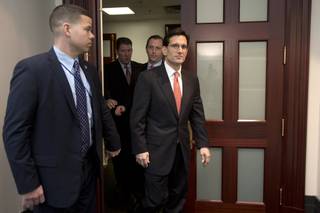
J. Scott Applewhite / AP
Speaker of the House John Boehner, R-Ohio, walks to a closed-door GOP caucus as Congress meets to negotiate a legislative path to avoid the so-called “fiscal cliff” of automatic tax increases and deep spending cuts that could kick in Jan. 1., at the Capitol in Washington, Sunday, Dec. 30, 2012.
Published Monday, Dec. 31, 2012 | 9:01 p.m.
Updated Tuesday, Jan. 1, 2013 | midnight
Related stories
The fiscal cliff deadline was missed. But within just a few hours, the Senate overwhelmingly passed a bipartisan, compromise plan to avert the adverse economic impact of rising taxes and across-the-board government tax cuts scheduled for Jan. 1.
The Senate voted 89-8 to avert the so-called “fiscal cliff” just after 2 a.m. Tuesday morning, Washington, D.C., time, after more than 24 hours of negotiations over an emerging deal that will extend income tax rates at the reduced, Bush-era levels up to $400,000, permanently.
It is now up to the House of Representatives to finish the job before the clock runs out on the current Congress at 11:59:59 a.m. on Jan. 3.
“I’m disappointed that we weren’t able to make the grand bargain, but we tried,” Senate Majority Leader Harry Reid said Tuesday morning, just before calling senators back to the chamber to vote. “But these are real cuts, they’re in this bill.”
Senate Minority Leader Mitch McConnell and Vice President Joe Biden struck a deal between Sunday and Monday to extend Bush-era tax cut rates on income levels up to $400,000, and allow income taxes above that threshold to rise from 35 percent to 39.6 percent on 2013 tax returns. It also extends unemployment benefits, the sales tax deduction, the mortgage debt relief deduction and energy tax credits through 2013, and pegs the maximum amount of inheritances that can be waived under the estate tax to inflation.
The deal is more than many Democrats wanted to swallow, especially the provisions concerning the estate tax and income taxes. Currently, the first $5 million of estates are waived from taxation; that number would have fallen to $1 million without the provision in the deal.
Democrats also believed that coming off a successful election, they had a mandate to extend current income tax rates no further than $250,000, a threshold they argued would include 98 percent of wage earners in America.
Throughout the day, various Democrats voiced their complaints with the proposal.
“No deal is better than a bad deal, and this looks like a very bad deal,” Iowa Democratic Sen. Tom Harkin said Monday morning, arguing that the emerging deal would forever, and mistakenly, define the “middle class” as people earning up to $400,000.
But when the deal was finally inked and rushed to the Senate floor for a vote at 1:35a.m., Harkin was one of only eight senators — three Democrats, five Republicans — who refused to vote for it.
Forty-nine Democrats supported the bill, including Reid, as did 40 Republicans, including Nevada Sen. Dean Heller.
Heller did not have many kind words for the deal, despite his “yea” vote.
“This entire process has been an embarrassment,” he said in a statement, in which his office reminded readers that Heller had been the only member of the Nevada delegation to vote against the 2011 debt ceiling deal, in which the sequestration cuts that are part of the fiscal cliff were first orchestrated.
The deal — now legislation — that passed the Senate in the wee hours of Tuesday morning does not immediately address scheduled “sequestration” spending cuts. Those are delayed for two months, to be addressed down the line in what promises to be yet another cliff-type scenario in March.
“While I did not get everything that I wanted, this bipartisan compromise will allow businesses to start planning for the future and ensure that unemployment benefits are extended at a time when so many Nevadans are looking for employment,” Heller continued.
Very few members of Congress were wholly satisfied with the deal.
“Everybody’s disappointed…Everybody wanted the grand bargain,” Sen. Dianne Feinstein, a California Democrat, lamented after Senate Democrats were briefed on the particulars of the bill. “It isn’t going to happen…but one thing we have now, if we have it , is a bipartisan majority, and that’s not to be easily dismissed.”
“There as disagreements on this provision, that provision, and other provisions that are large and wide, but the nmber of people who believe that we should go over the cliff rather than vote for this is very small,” said Sen. Chuck Schumer, a Democrat from New York. “So I think you’re going to see a strong Democratic vote for this proposal.”
The Senate overwhelmingly positive vote for the fiscal cliff deal is not, however, the end of the line.
House Speaker John Boehner released a statement late Monday saying that the House would “honor its commitment to consider the Senate agreement if it is passed,” but left himself an open door to amend the legislation after it arrived in the House.
The House reconvenes at noon on Tuesday, just 24 hours before the end of the 112th Congress’ session.
President Barack Obama is already urging members of the House to pass the bill with haste when they return.
“While neither Democrats nor Republicans got everything they wanted, this agreement is the right thing to do for our country,” Obama said in a statement released early Tuesday. “The House should pass it without delay.”


Join the Discussion:
Check this out for a full explanation of our conversion to the LiveFyre commenting system and instructions on how to sign up for an account.
Full comments policy